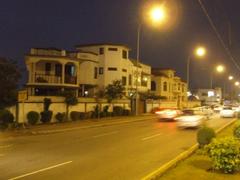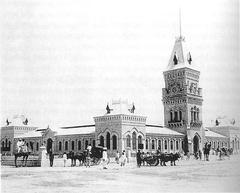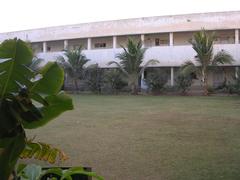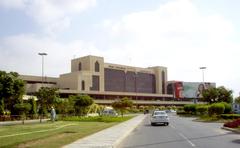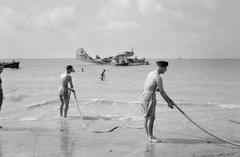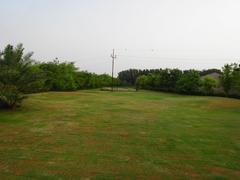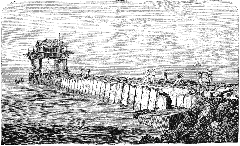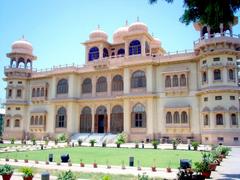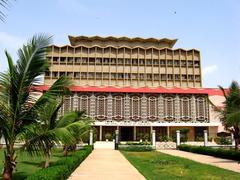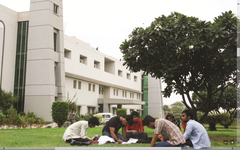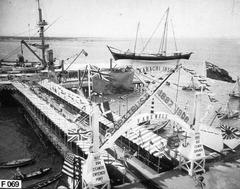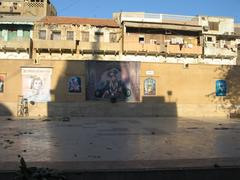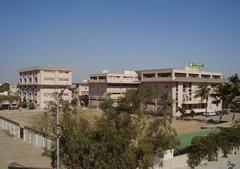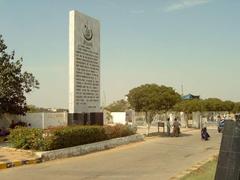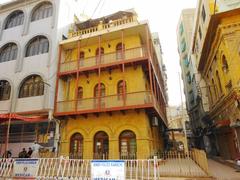Karachi Cantonment Visiting Hours, Tickets, and Historical Sites Guide
Date: 15/06/2025
Introduction
Karachi Cantonment, or Karachi Cantt, is a historic urban district in the heart of Karachi, Pakistan. Established in the 19th century as a British military garrison, it has evolved into a lively area where colonial heritage, commercial vibrancy, and residential life coexist. Renowned landmarks such as Frere Hall, Empress Market, and the Karachi Cantonment Railway Station stand as reminders of its colonial legacy and strategic significance. Today, the cantonment serves as a transport hub and cultural center, offering lush parks, museums, bustling markets, and proximity to major city attractions (Wikipedia: History of Karachi; Zameen: Karachi Railway Station Overview; Graana).
This guide provides a comprehensive overview of Karachi Cantonment’s history, practical visitor information, safety tips, transportation options, and recommendations for exploring its unique blend of heritage and urban life.
Contents
- Historical Overview: Pre-Colonial to Modern Era
- Key Landmarks and Attractions
- Visitor Information: Hours, Tickets, and Accessibility
- Safety and Transportation
- Culinary, Social, and Cultural Insights
- Practical Tips and Visitor FAQs
- Summary and Recommendations
- Sources
Historical Overview
Pre-Colonial and Bronze Age Foundations
Archaeological research reveals that the Karachi region has been inhabited since prehistoric times, with evidence from the Mulri Hills indicating Late Paleolithic and Mesolithic settlements. During the Bronze Age, it was part of the Indus Valley Civilization, with sites like Allahdino and Pir Shah Jurio revealing advanced urban culture. Banbhore, referenced by ancient Greeks, was a notable port city highlighting Karachi’s early maritime significance (Wikipedia: History of Karachi).
Colonial Era and the Establishment of the Cantonment
British colonial rule in the 19th century transformed Karachi into a strategic base. The British East India Company established Karachi Cantonment in 1839, building it as a military hub with clear urban planning and restricted access for locals. Landmarks such as Frere Hall (1865), Empress Market (1889), and the Karachi Cantonment Railway Station (1896–1898) emerged as architectural icons of the period (Wikipedia: History of Karachi; Zameen: Karachi Railway Station Overview; PQA: About Karachi).
By the late 1800s, Karachi became the largest grain-exporting port in the British Empire, and the cantonment was the administrative, logistical, and social heart of British Karachi (PQA: About Karachi).
Post-Independence Transformation
After 1947, Karachi became Pakistan’s first capital, and the cantonment area’s demographic profile shifted with an influx of refugees. Although the capital later moved to Islamabad, Karachi Cantonment retained its status as a military, administrative, and commercial hub (PQA: About Karachi; Zameen: Karachi Railway Station Overview).
Key Landmarks and Attractions
Colonial Heritage and Iconic Sites
- Frere Hall: Built in 1865, this Venetian Gothic structure hosts art exhibitions and public events. Open Tuesday–Sunday, 9 AM–6 PM, free entry. Its gardens are a peaceful retreat (Graana).
- Empress Market: A vibrant Indo-Saracenic market (1884–1889) open daily 8 AM–9 PM, offering spices, textiles, and fresh produce. Entry is free (Zameen).
- Karachi Cantonment Railway Station: The largest railway station in Pakistan, open 24/7. Its colonial architecture and preserved steam engine are highlights (Wikipedia).
Parks and Coastal Attractions
- Bagh Ibn-e-Qasim: The city’s largest urban park, ideal for families, open dawn to dusk, free entry (Zameen).
- Jehangir Kothari Parade: A historic promenade with sea views, open daily 7 AM–7 PM, wheelchair accessible (JBMS).
- Clifton Beach: Accessible 24/7, featuring food stalls and camel rides (JBMS).
Museums and Cultural Centers
- Mohatta Palace Museum: Indo-Saracenic palace with art exhibitions, open Tues–Sun, 10 AM–6 PM (closed Monday), PKR 200 entry (Trip101).
- National Museum of Pakistan: Exhibits on Indus Valley Civilization and Islamic art, open 9 AM–5 PM, PKR 100 entry (Graana).
- PAF Museum: Aviation history museum, open daily 9 AM–5 PM, free entry (Guide to Pakistan).
Markets, Shopping, and Food Streets
- Empress Market Area: Bustling market and green spaces, open daily 8 AM–9 PM. Bargaining is common (Zameen).
- Port Grand: Waterfront complex with food streets and galleries, open 11 AM–midnight, free entry (charges apply for dining/activities).
Religious and Memorial Sites
- Mazar-e-Quaid (Quaid-e-Azam’s Mausoleum): Open 24/7, free entry. A white marble mausoleum honoring Pakistan’s founder, with gardens and national events (Zameen).
Notable Colonial Infrastructure
- Dumlottee Wells: 1880s colonial water supply system; visits by arrangement (Wikipedia).
- Karachi Port Trust Building: Colonial maritime landmark, external viewing recommended (Trip101).
Visitor Information: Hours, Tickets, and Accessibility
- Frere Hall: Tues–Sun, 9 AM–6 PM, free entry.
- Empress Market: Daily, 8 AM–9 PM, free entry.
- Karachi Cantonment Railway Station: 24/7 access (platforms free; train tickets extra).
- Bagh Ibn-e-Qasim: Dawn to dusk, free entry.
- Museums: Mohatta Palace (Tues–Sun, ticketed); National Museum (daily, ticketed).
- Special Events: Some venues may host ticketed exhibitions or festivals—check local listings.
Most public areas and parks offer wheelchair access; colonial buildings may have limited accessibility.
Safety and Security
General Safety
Karachi Cantonment is among the city’s safer districts due to military presence and CCTV surveillance. Petty crimes like pickpocketing can occur, especially in crowded markets and on public transport (Traveling.com.pk). Stay in well-lit areas after dark, secure valuables, and avoid political gatherings (TripJive). Embassies recommend registering on arrival.
Health
Ensure vaccinations are up to date. Drink bottled or boiled water and carry basic medications. Major hospitals like Aga Khan University Hospital and Jinnah Postgraduate Medical Centre are nearby.
Transportation Options
- Public Buses: Peoples Bus Service connects main areas (fares ~PKR 50). The BRT network is expanding (HamariWeb).
- Taxis/Ride-Hailing: Use metered yellow/black taxis or apps like Careem and Uber for convenience (Apricot Tours).
- Car Rental: Available but best with a local driver.
- Railways: Karachi Cantonment Railway Station connects to major cities. Book early and travel in higher classes.
- Walking/Cycling: Feasible for short distances, but sidewalks and traffic require caution.
Culinary, Social, and Cultural Insights
The cantonment’s culinary scene ranges from upscale restaurants to street food stalls. Dishes like biryani and seafood are local favorites. Social clubs like Karachi Gymkhana offer recreational activities for members. The area celebrates festivals such as Eid, Christmas, and Diwali with public events, fostering interfaith harmony (Apricot Tours; Lovin Pakistan).
Practical Tips and Visitor FAQs
Dress Code and Etiquette
Wear modest, lightweight clothing, especially in religious or official sites. Photography is allowed in most public spaces, but ask permission before photographing people or sensitive areas.
Best Visiting Times
October to March offers comfortable weather for sightseeing. Early mornings and evenings are pleasant year-round.
Connectivity
Local SIM cards (Jazz, Telenor, Zong, Ufone) are widely available. Wi-Fi is common in hotels and cafes.
Emergency Numbers
- Police: 15
- Ambulance: 115
- Fire: 16
FAQs
Q: Are tickets required for most historical sites?
A: Most are free; some museums and events may charge nominal fees.
Q: Is Karachi Cantonment wheelchair accessible?
A: Many public areas are accessible, but some colonial sites may have limited access.
Q: How safe is Karachi Cantonment for tourists?
A: It is among Karachi’s safer areas, but standard precautions are advised.
Q: What languages are spoken?
A: Urdu and English are widely used; other local languages are common.
Summary and Recommendations
Karachi Cantonment is a microcosm of Karachi’s rich history and multicultural present. From colonial landmarks and vibrant markets to serene parks and dynamic social life, it offers diverse experiences for every traveler. Plan your visit around landmark opening hours (typically 9 AM–6 PM), check for ticket requirements, and respect local customs. Leverage digital tools like the Audiala app for real-time updates and itineraries.
Whether you’re passionate about history, culture, or simply exploring new urban landscapes, Karachi Cantonment promises a memorable journey. For the latest information, event updates, and travel inspiration, follow official tourism channels and download the Audiala app (Karachi Tourism; Graana).
Sources and Further Information
- Wikipedia: History of Karachi
- Zameen: Karachi Railway Station Overview
- Karachi Tourism
- Graana: An Overview of Karachi Cantt
- Apricot Tours: Karachi Tour 1 Day
- Traveling.com.pk: Karachi Safety and Travel Tips
- HamariWeb: Red Bus Service Guide
- JBMS: Best Places to Visit in Karachi
- Trip101: Historical Places in Karachi
- Guide to Pakistan: Karachi Travel Guide
- Lovin Pakistan: Places to Visit in Karachi
- TripJive: Karachi Safety Guide
- TravelLikeABoss: Is it Safe to Travel to Karachi?
- Travel Culture: Bus Routes in Karachi
- Urban Matters Journal: Karachi’s Historic Landscape
- Pakorangi: Famous Historical Landmarks in Karachi
